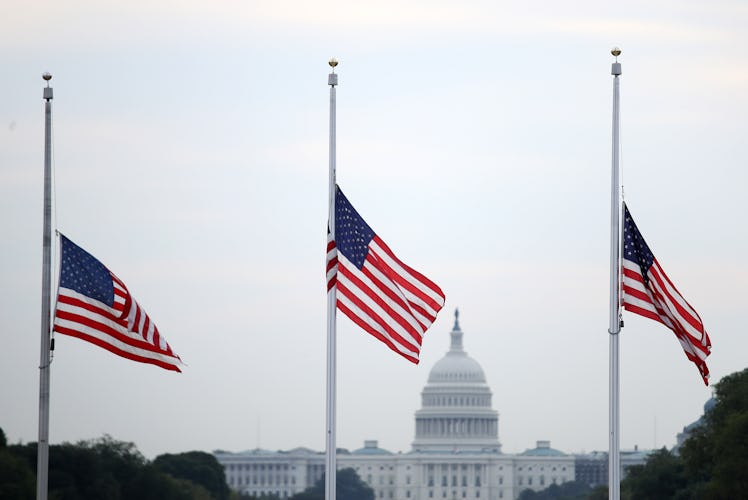
Here's What To Know About Red Flag Laws & What They Do
In the wake of the deadly El Paso, Texas, and Dayton, Ohio, shootings, which claimed at least 30 lives over the weekend of Friday, Aug. 2, lawmakers and civilians alike are calling for reform to current gun control legislation. While public figures from both sides of the political spectrum have shared their proposals, prominent members of the Republican party including President Donald Trump, Ivanka Trump, and Sen. Lindsey Graham of South Carolina have called for the implementation of red flag laws, which are currently the law in a few different states. Here's the rundown on the legislation if you're wondering, what are red flag laws and how do they work?
Shortly after news broke of the two shootings, the president addressed the nation during a press conference on Monday, Aug. 5. In addition to blaming violent video games, the internet and the alleged mental health of the shooters for the attacks, he also voiced his support for red flag laws. "We must make sure that those judged to pose a grave risk to public safety do not have access to firearms," he said. "That is why I have called for red flag laws, also known as Extreme Risk Protection Orders."
Red flag laws, which have been enacted in several states, allow household members, loved ones, or authorities to appeal to state courts to temporarily limit access to guns for people who could potentially be a danger to themselves or others. The laws differ from state to state in terms of details such as who can request the limited access to guns, and what grounds they can cite for their concern. In some states, such as California, household members can request the limitation, while in other states, such as Florida, only law enforcement or other authorities can make the request. In states such as Maryland, health workers can make the request. The states also differ on the level of evidence required to limit access to guns, and whether or not the subject of the order will have the guns they already possess removed, or if they will also be prohibited from acquiring new guns.
According to the Giffords Law Center To Prevent Gun Violence, as of 2019 there are 17 states, plus Washington D.C., that have passed versions of red flag laws.
However, while red flag laws have gotten more popular at the state level, there's no equivalent national law — yet. Besides the president, Ivanka Trump and Sen. Lindsey Graham have spoken out in support of rolling out the legislation nationwide, with Graham saying in a statement on Monday, Aug. 5, that he had reached a deal with Democratic Sen. Richard Blumenthal of Connecticut on moving the process forward.
However, red flag laws have one obvious limitation, in that it requires someone to raise the alarm. It's also important to note that people with mental illnesses are more likely to be the victims of violence than the perpetrators, with a fact sheet from MentalHealth.gov noting that people with mental illnesses are 10 times more likely than the general population to be the victim of violence.
It's also worth noting that the vast majority of gun violence is self-directed, with nearly two-thirds of gun deaths being the result of suicide. According to data from gun safety advocacy group Everytown For Gun Safety, access to a gun increases the risk of death by suicide threefold, and the rates of suicide by a firearm are especially high in states where there were higher than average rates of gun ownership. A study of red flag laws in Connecticut and Indiana, published in the American Psychiatric Association's journal Psychiatric Services in 2018, found that the laws were associated with a reduction in gun suicide rates in the two states.
Red flag laws are not the only thing Trump has mentioned to address gun violence, but they seem to be the solution he's giving the most attention to. In a tweet on Aug. 5, the president appeared to suggest that he was open to working on a bipartisan bill that would tie stronger background check laws with immigration reform, which many found puzzling as neither of the two alleged shooters were immigrants. He wrote,
We cannot let those killed in El Paso, Texas, and Dayton, Ohio, die in vain. Likewise for those so seriously wounded. We can never forget them, and those many who came before them. Republicans and Democrats must come together and get strong background checks, perhaps marrying ... this legislation with desperately needed immigration reform. We must have something good, if not GREAT, come out of these two tragic events!
However, during his public remarks on Aug. 5, the president made no mention of expanded background checks or immigration. The White House did not respond to an Elite Daily inquiry for additional comment about the tweets.
As of now, it remains to be seen what legislation, if any, the U.S. government carries out to combat any future mass shootings, but the recent tragedies in El Paso and Dayton are once again putting pressure on Congress and the Trump administration to act and make some changes.